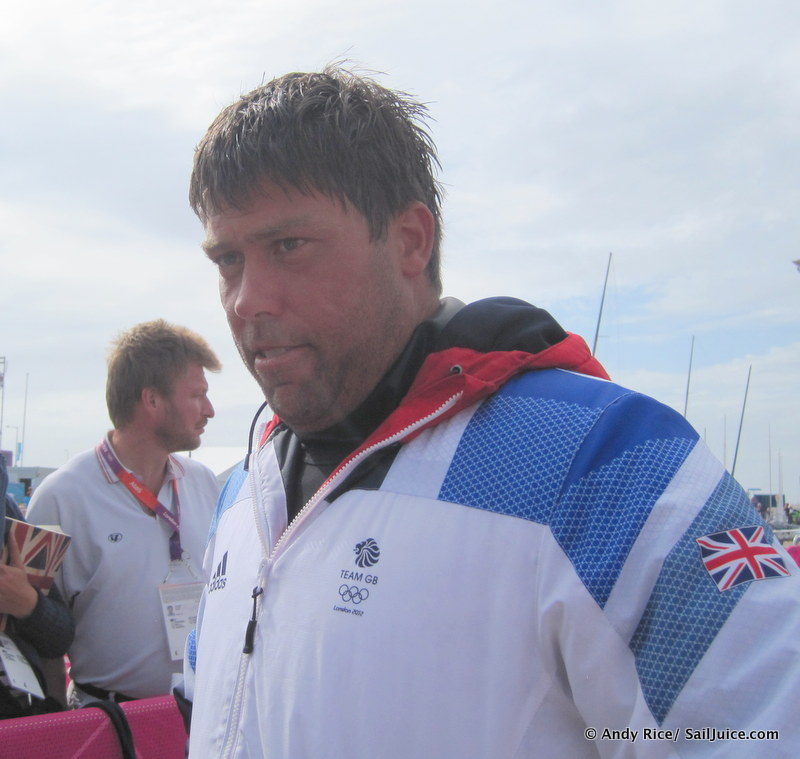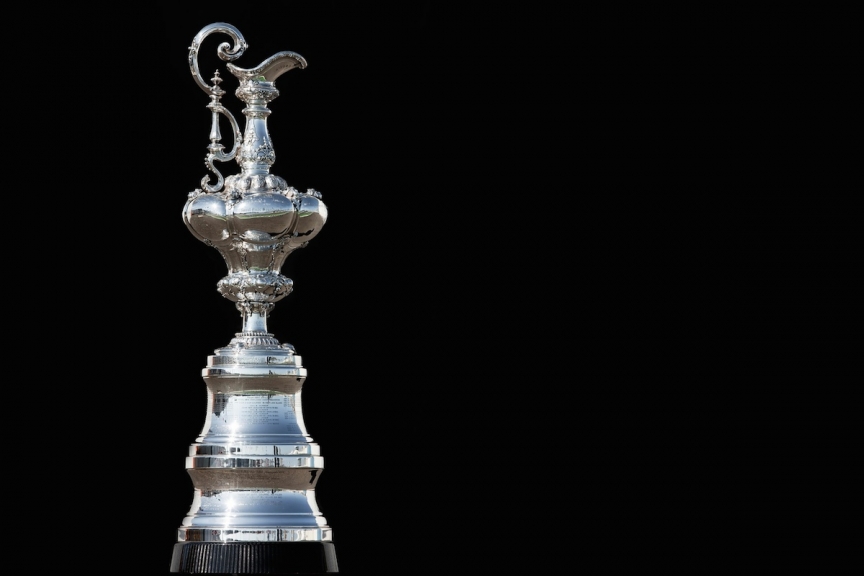About a year ago I used this column to put out a madcapped theory about holding a virtual Sunday morning race. “Pretty much every club in the country has a race on a Sunday morning, with all kinds of boat taking part. Race results are captured electronically on software packages such as Sailwave and Excel. So why can’t the results from different sailing clubs be mashed together to create one big nationwide race on a Sunday morning? A weekly handicap racing championship!”
Well Tony Bishop, general manager at Queen Mary Sailing Club, has taken that madcap idea and turned it into something real, and much, much bigger. It’s called Bart’s Bash, named in honour of Andrew ‘Bart’ Simpson, our larger-than-life Olympic Champion who lost his life last May in that horrific crash on board Artemis Racing’s AC72. Tony approached the Andrew Simpson Sailing Foundation and proposed the idea of staging a race that would take place simultaneously across the country. Not only that, but if the event could achieve a target of 200 participating clubs each averaging 50 competitors, then those 10,000 competitors could make a strong case for participating in the biggest ever dinghy sailing race. It could be a new Guinness World Record!
The Foundation - which was set up by a group of Bart’s friends family including his wife Leah, sister Amanda and close friends Iain Percy and Ben Ainslie - loved the idea. And so Bart’s Bash was announced to the world on 17 December, Bart’s birthday. On Sunday morning at 11am on 21 September, Bart’s Bash would take place at clubs across the UK. The announcement took off around the sailing world like wildfire, and captured the attention of the wider media including the BBC. Within three days of the launch, more than 60,000 people had seen the information on The Bart Project Facebook page, more than 700 had shared it and in less than five days over 100 clubs from around the world had signed up for the event.
Although the event was conceived as a UK-based dinghy race, the ambition of Bart’s Bash has since grown much larger. With enquiries from countries around the world including the USA, Australia and even Kenya, and from yacht clubs as well as dinghy clubs, the event is now aiming to be the ‘biggest sailing race’, full stop. Not just a dinghy race in the UK, but a global regatta that will encompass pretty much all sail-powered water craft, from dinghies, to cats, keelboats, windsurfers and maybe kiteboards too? Even the radio-controlled sailing community wants to get involved. And why not?
Well, without wanting to pour too much oil on the fire of enthusiasm, the ‘why not’ is making sure that ‘Bart’s Bash’ isn’t just a jamboree, but a measurable race. It will need to be a bona fide race in order to fulfil the criteria of a Guinness World Record. Some very tough work lies ahead in terms of creating a handicap rating system capable of sensibly benchmarking a Laser against a Sigma 33, a Hobie 16, a RS-X windsurfer and a RC Laser, to name a few examples. Bearing in mind my own experience of watching the Great Lakes committee at work analysing and adjusting the PY numbers in the GJW Direct SailJuice Winter Series - and that’s just for dinghies in one country - coming up with a set of comparative numbers for almost any sail-powered craft in multiple countries across the world will be much, much harder.
But worth doing? Absolutely. Bart’s Bash offers a once-in-a-lifetime opportunity to pull together the diverse areas of our sport which too often are in conflict each other. Look at how the Olympic classes start slagging each other off when there is a change of events, such as we saw in the kiteboard v windsurfer spat of last year, or the Tornado v Star battle back in 2007; or the mudslinging that goes on between different yacht racing rating systems; or the ‘my boat’s better than yours’ arguments that go on in sailing forums. Why not focus on growing the sailing pie for everyone rather than trying to poach from each others’ back yards?
One of the great legacies of the 34th America’s Cup with its move to catamarans is how, at the professional level of the sport, the sailors are much less likely to categorise themselves purely as monohull or multihull specialists. Great sailors like Sir Ben, Iain, Chris Draper, and many more, have proven that their skills are transferable into any kind of boat. If Bart’s Bash could build on that spirit of unifying the sport, and put aside the tendency to segment and divide, what a great legacy for Bart that would be. In UK dinghy sailing we compete with a Portsmouth Yardstick number. What if the whole sailing world were to compete every Sunday with a Bart Number?
Roll Tacks - January 2014
Related Articles

Ben Ainslie & Iain Percy remember their friend Andrew 'Bart' Simpson
 Speaking at Weymouth in May 2014, Iain Percy and Sir Ben Ainslie remember their great friend, Bart Simpson, as they launch the Andrew Simpson Sailing Foundation and its first school at the venue of London 2012, where Bart won the second of his two Olympic medals....
Speaking at Weymouth in May 2014, Iain Percy and Sir Ben Ainslie remember their great friend, Bart Simpson, as they launch the Andrew Simpson Sailing Foundation and its first school at the venue of London 2012, where Bart won the second of his two Olympic medals....
Read More

America's Cup - December 2013
 Why bother match racing at 4 knots when the America’s Cup demands you race at 40? I asked the Italians from Luna Rossa this question at the Monsoon Cup in Malaysia. Meanwhile, what to make of Iain Murray’s job change, from gamekeeper to poacher? And which other big-name Australians will follow the ‘Big Fella’ to Hamilton Island?
Why bother match racing at 4 knots when the America’s Cup demands you race at 40? I asked the Italians from Luna Rossa this question at the Monsoon Cup in Malaysia. Meanwhile, what to make of Iain Murray’s job change, from gamekeeper to poacher? And which other big-name Australians will follow the ‘Big Fella’ to Hamilton Island?
Read More
 Why bother match racing at 4 knots when the America’s Cup demands you race at 40? I asked the Italians from Luna Rossa this question at the Monsoon Cup in Malaysia. Meanwhile, what to make of Iain Murray’s job change, from gamekeeper to poacher? And which other big-name Australians will follow the ‘Big Fella’ to Hamilton Island?
Why bother match racing at 4 knots when the America’s Cup demands you race at 40? I asked the Italians from Luna Rossa this question at the Monsoon Cup in Malaysia. Meanwhile, what to make of Iain Murray’s job change, from gamekeeper to poacher? And which other big-name Australians will follow the ‘Big Fella’ to Hamilton Island? 
Roll Tacks - June 2013
Great to see Luke Patience and Stu Bithell throwing themselves into the Wilson Trophy, the sort of unofficial world championship of team racing. We don’t often see the Olympic stars get involved in the nitty gritty of the amateur dinghy racing scene, and who can blame them? Must be a bit of a busman’s holiday, going sailing in your spare time. So it’s nice to see it when it does happen, like Paul Goodison and Saskia Clark doing a bit of Essex dinghy racing last summer just weeks after London 2012, and now Luke and Stu getting stuck into team racing.
Read More

America's Cup - May 2013
 The death of Andrew ‘Bart’ Simpson has been a huge wake-up call for the organisers of the America’s Cup who have been mounting an eleventh hour review of safety issues, things that should have been discussed and resolved after Oracle’s AC72 capsize last October. All too late for Bart, but let’s hope these safety proposals will avert further fatalities this summer.
The death of Andrew ‘Bart’ Simpson has been a huge wake-up call for the organisers of the America’s Cup who have been mounting an eleventh hour review of safety issues, things that should have been discussed and resolved after Oracle’s AC72 capsize last October. All too late for Bart, but let’s hope these safety proposals will avert further fatalities this summer.
Read More
 The death of Andrew ‘Bart’ Simpson has been a huge wake-up call for the organisers of the America’s Cup who have been mounting an eleventh hour review of safety issues, things that should have been discussed and resolved after Oracle’s AC72 capsize last October. All too late for Bart, but let’s hope these safety proposals will avert further fatalities this summer.
The death of Andrew ‘Bart’ Simpson has been a huge wake-up call for the organisers of the America’s Cup who have been mounting an eleventh hour review of safety issues, things that should have been discussed and resolved after Oracle’s AC72 capsize last October. All too late for Bart, but let’s hope these safety proposals will avert further fatalities this summer. 
Roll Tacks - February 2013
Great sailors - born or made? The same is asked of any number of successful people in other walks of life. So what’s the answer? No one can really say, but my observations from Olympic level sailing suggest that talent is what gets you noticed, but it’s hard work and practice that really makes the difference at the top level.
Read More
